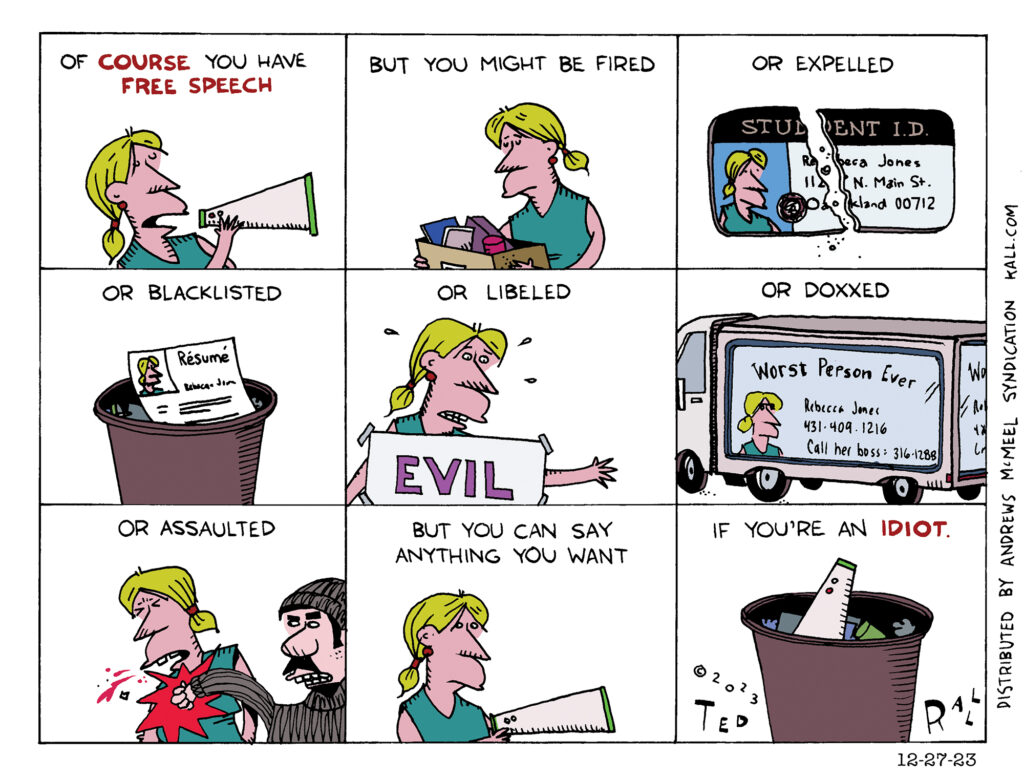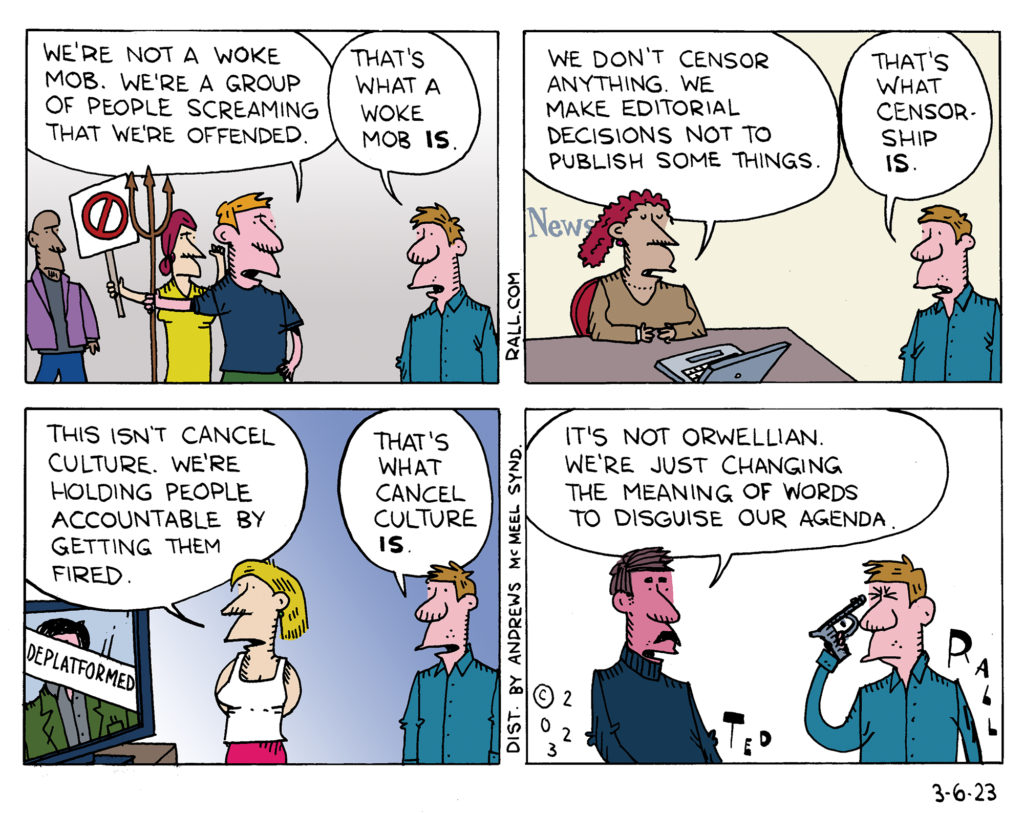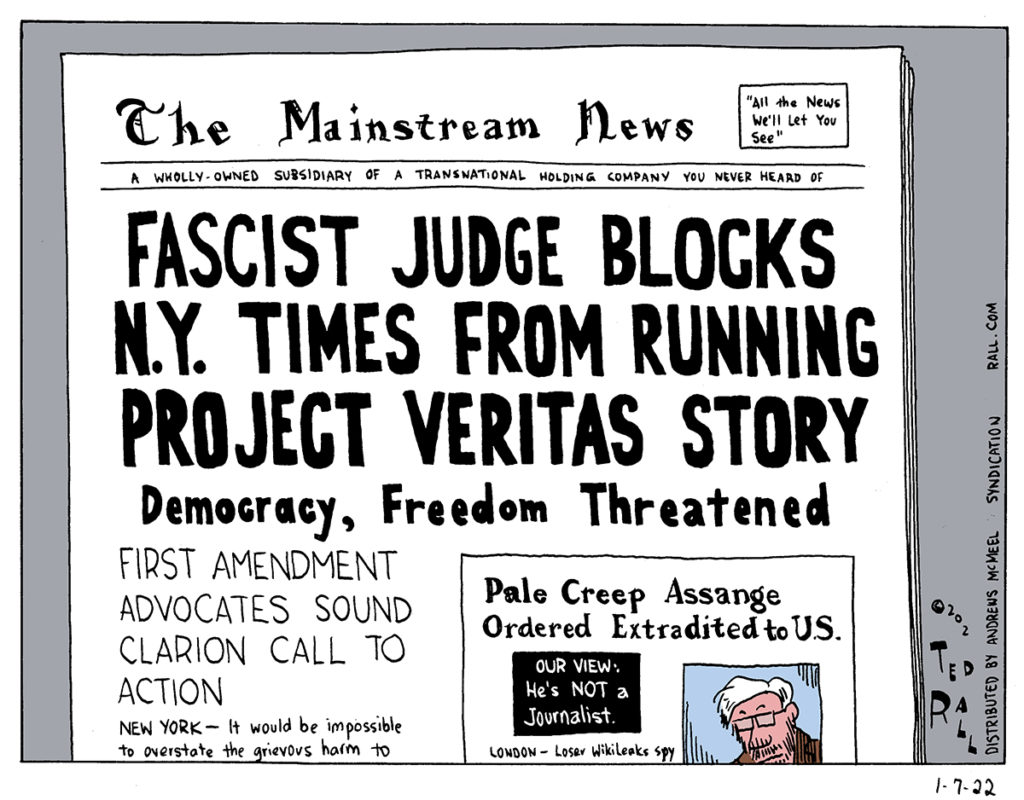
It’s too bad we can’t monetize censorship, because we truly live in a golden age of speech suppression. In this deeply polarized society, the one thing we can all agree upon is that people we disagree with need to shut up.
Officially, freedom of speech is a key commandment in our national civic religion. We love free speech—in the abstract. Nine out of ten Americans told a 2022 Knight Foundation/Ipsos study that “protecting free speech is an important part of American democracy” and that “people should be allowed to express unpopular opinions.” Yay, America!
When people express specific unpopular opinions, not so yay. 70% of respondents to the same study said that, for example, COVID-19 misinformation ought to be banned. Some even called for those who spread it (even though some of it may turn out to be true) to be jailed.
Young people often call for those they disagree with to shut their yaps. A College Pulse/Foundation for Individual Rights and Expression poll found that 71% of today’s college students would ban someone from speaking on campus if that person viewed transgender people as being mentally ill or they thought Black Lives Matter was a hate group. 57% said that anti-abortion activists should never be allowed to speak in public.
And if objectionable speech manages to slip through? 63% think it’s OK to shout you down if you’re saying something they don’t like.
Nowadays, though, young people are big targets of censorship too.
At my alma mater, Columbia, administrators have been coming down like a ton of bricks against peaceful student demonstrators calling for a ceasefire in Gaza and for the university to divest its financial investments in Israel-affiliated companies. Back in November, long before American college and university campuses saw the current spread of encampments and other protests, Columbia suspended two student groups, Students for Justice in Palestine and Jewish Voice for Peace.
Why? No reason was given. “The university did not elaborate on how exactly the groups did that except to say they had held ‘unauthorized’ events that included unspecified ‘threatening rhetoric and intimidation,’” The New York Times reported. As an alumnus and veteran of protests there, I can attest that Columbia’s rules do not require demonstrators to obtain authorization from campus authorities.
No pro-Palestinian protester at Columbia had carried out any actual violence or violent threats. They still haven’t.
After wealthy pro-Israel alums withdrew their donations, cash-grubbing Columbia president Nemat “Minouche” Shafik went full-spectrum fascist in voluntary testimony on Capitol Hill. Calling the slogan “from the river to the sea, Palestine will be free” anti-Semitic (it isn’t), she cravenly groveled before a cabal of far-right Congressional goons, agreed that anti-Semitism is rampant on the Columbia campus (a lie), claimed that she had launched investigations of pro-Palestine instructors (if so, it was news to them) and when Republican lawmakers demanded that she fire a tenured professor of Middle Eastern, South Asian and African studies for allegedly saying the October 7th attack by Hamas was “awesome” (he didn’t), she agreed to get rid of and other educators him (she can’t).
To drive the point home, Shafik suspended pro-Palestinian student demonstrators (pro-Israel marchers get a free pass) and asked heavily-armed NYPD riot cops to violently arrest them and steal their personal possessions. Campus security guards shut down WKCR, the campus radio station, so student journalists could no longer report the news.
Fascist administrators ordered similar police crackdowns at protests at such institutions as Princeton, USC, UT Austin, Emerson, Cal State Poly Humboldt and Emory, where Atlanta cops tased and maced students as they held them down. Brutal tactics only serve to further inflame passions, a fact reconfirmed when the encampment at Columbia was immediately reassembled the next day. USC valedictorian Asna Tabassum, denied her right to deliver her commencement address because she is Muslim and supports the people of Gaza, has received infinitely more attention to her message because she was censored.
Not wanting to miss out on this latest McCarthyite moment, however, employers who support Israel’s slaughter of Gazans are firing journalists, teachers, athletes, editors and tech workers who disagree. Far-right Republican House Speaker Mike Johnson has demanded that federal workers who oppose the bloodshed be fired while a group of pro-genocide corporate CEOs is organizing a blacklist of pro-Palestine college students to distribute to major companies so these young people won’t be able to find a job after graduation. (Student activists have taken to wearing masks and scarves to avoid being doxxed by reactionary supporters of Israel’s war.)
Those who resort to censorship do so because they don’t have a credible message of their own. When the overwhelming majority of the American public, Democrats and Republicans alike, disapproves of Israel—a longstanding ally of the U.S.—it’s clear that the usual lame “if you oppose Israel you’re anti-Semitic” trope is no longer effective. We are no longer scared.
Like the political parties who work harder to suppress the vote for the other party than to motivate and excite their own supporters, those who have nothing affirmative to say for their own position strive to make sure that those on the other side, who have a strong argument, cannot express themselves.
Censorship is a tool used by those who know they are wrong.
Censoring antiwar voices is nothing new. Columbia suspended and expelled opponents of the Vietnam War in 1968. And when the Russo-Ukrainian war broke out in 2022, the U.S. government and its media mouthpieces censored Russian media outlets, boycotted Russian culture and even attacked Russian cats. But the truth about Ukraine—its corrupt president, its official romance with neo-Nazism, its anti-democratic regime and its low chance of success—is coming out.
Yet optimism is the wrong response to this attempt to crush voices of conscience. Every spasm of mass censorship leaves a trail of cynicism, stifled voices, stunted careers and an ever-shrinking spectrum of expression. Remember Al Jazeera America? Phil Donahue’s show on MSNBC?
They were casualties of the War on Terror’s Bush-era censors; we could use them now.
Again, we are losing good people with important voices.
(Ted Rall (Twitter: @tedrall), the political cartoonist, columnist and graphic novelist, co-hosts the left-vs-right DMZ America podcast with fellow cartoonist Scott Stantis. You can support Ted’s hard-hitting political cartoons and columns and see his work first by sponsoring his work on Patreon.)








